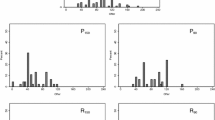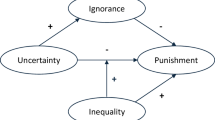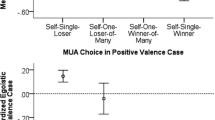Abstract
Two recent models incorporating fairness considerations into the economics literature based on agents' concerns about the distribution of payoffs between themselves and others (Fehr-Schmidt, 1999, Quarterly Journal of Economics. 114 (3), 769–816; Bolton-Ockenfels, 2000, American Economic Review. 90, 166–193) are investigated using a new three-person ultimatum game: One person allocates a sum of money to two others, one of which is randomly chosen to accept or reject the offer. Rejection gives both the responder and the proposer zero income and a positive consolation prize for the non-responder. The data show essentially no reductions in rejection rates, holding offers constant, with and without consolation prizes, contrary to both models' predictions.
Similar content being viewed by others
References
Blount, S. (1995). “When Social Outcomes Aren't Fair: The Effect of Causal Attributions on Preferences.” Organizational Behavior and Human Decision Processes. 63(2), 131–144.
Bolton, G. and Ockenfels, A. (1998). “Strategy and Equity: An ERC analysis of the Güth-van Damme Game.” Journal of Mathematical Psychology. 42(2), 215–226.
Bolton, G. and Ockenfels, A. (2000). “ERC: A Theory of Equity, Reciprocity and Competition.” American Economic Review. 90, 166–193.
Charness, G. (1998). “Attribution and Reciprocity in a Simulated Labor Market: An Experimental Investigation.” Mimeographed, Universitat Pampea Fabra.
Charness, G. and Rabin, M. (2000). “Social Preferences: Some Simple Tests and a New Model.” Mimeographed.
Dufwenberg, M. and Kirchsteiger, G. (1999). “ATheory of Sequential Reciprocity.” Mimeo, CentER for Economic Research, Tillburg.
Falk, A and Fisbacker, U. (1999). “A Theory of Reciprocity.” Working paper number 6, University of Zurich.
Fehr, E., Kirchsteiger, E., and Riedl, A. (1993). “Does Fairness Prevent Market Clearing? An Experimental Investigation.” The Quarterly Journal of Economics. 108, 437–459.
Fehr, E. and Schmidt, K. (1999). “A Theory of Fairness, Competition and Cooperation.” Quarterly Journal of Economics. 114(3), 769–816.
Fershtman, C. and Gneezy, U. (2001). “Strategic Delegation: An Experiment.” RAND Journal of Economics. 32, 352–368.
Forsythe, R., Horowitz, J., Savin, N.E., and Selton, M. (1994). “Fairness in Simple Bargaining Experiments.” Games and Economic Behavior. 6, 347–369.
Güth, W. and Van Damme, E. (1998). “Information, Strategic Behavior and Fairness in Ultimatum Bargaining: An Experimental Study.” Journal of Mathematical Psychology. 42(2/3), 227–247.
Ham, J.C., Kagel, J.H., and Lehrer, S.F. (in Press). “Randomization, Endogeniety, and Laboratory Experiments.” Journal of Econometrics.
Hsiao, C. Analysis of Panel Data. (1986). Cambridge University Press, Cambridge.
Kagel, J., Kim, C., and Moser, D. (1996). “Fairness in Ultimatum Games with Asymmetric Information and Asymmetric Payoffs.” Games and Economic Behavior. 13(1), 100–110.
Kahneman, D. and Tversky, A. (1979). “Prospect Theory: An Analysis of Decision Under Risk.” Econometrica. 47, 263–291.
Levine, D.K. (1998). “Modeling Altruism and Spitefulness in Experiments.” Review of Economic Dynamics. 1(3), 593–622.
Oberholzer-Gee, F. and Eichenberger, R. (1998). “Fairness! What Fairness? Focusing Effects in Dictator Game Experiments.” Working paper, University of Zurich.
Rabin, M. (1993). “Incorporation Fairness into Game Theory and Economics.” American Economic Review. 83(5), 1281–1302.
Roth, A.E., Prasnikar, V., Okuno-Fujiwara, M., and Zamir, S. (1991). “A Bargaining and Market Behavior in Jerusalem, Ljubljana, Pittsburgh, and Tokyo: An Experimental Study.” American Economic Review. 81(5), 1068–1095.
Author information
Authors and Affiliations
Rights and permissions
About this article
Cite this article
Kagel, J.H., Wolfe, K.W. Tests of Fairness Models Based on Equity Considerations in a Three-Person Ultimatum Game. Experimental Economics 4, 203–219 (2001). https://doi.org/10.1023/A:1013290819565
Issue Date:
DOI: https://doi.org/10.1023/A:1013290819565




